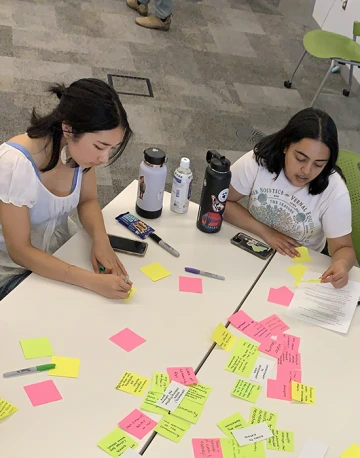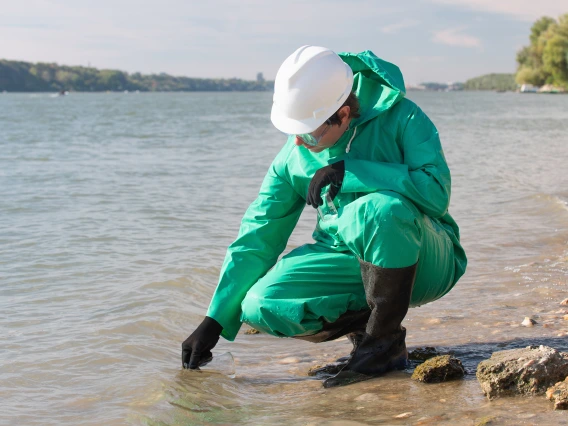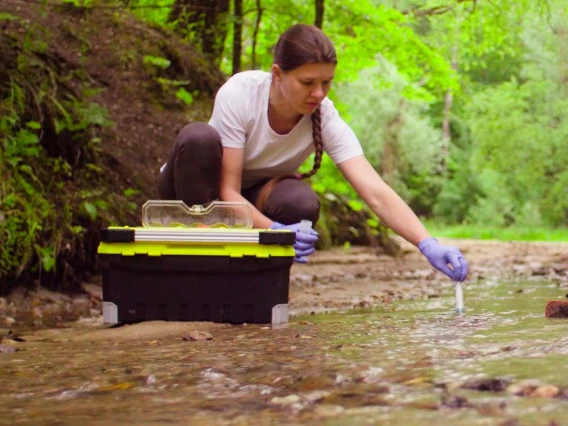Resilience Practice
Professional Science Master's
Quick Facts

Top 1%
of all Higher-Ed
Institutions
- Center for World University Rankings, 2024
#1
In Best Value Among
Arizona's Public Universities
- Payscale, 2024
Grounded in place and global in impact, the Professional Science Master’s in Resilience Practice (PSM) trains future leaders to design, implement, and evaluate solutions to today’s most pressing environmental and social challenges. Developed by the Arizona Institute for Resilience and offered through the College of Social and Behavioral Sciences, this interdisciplinary program blends applied coursework, field-based learning, and community engagement.
You’ll explore systems thinking, intercultural knowledge, science communication, and collaborative leadership while building skills in project design, environmental planning, and resilience measurement. The program’s flexible, practice-based curriculum culminates in a real-world capstone project, completed with a community or organizational partner.
With three areas of emphasis – Climate Adaptation and Mitigation, International Development, and Water Conservation and Adaptation – you can tailor your learning to align with your professional goals. Graduates are prepared for impactful careers as resilience professionals in public, private, or nonprofit sectors.
*Residents of some U.S. Territories may not be eligible. Please see our Eligibility & State Authorization page for more information.
The curriculum for this program includes:
Learn how inviting different ways of knowing can benefit environmental decision-making. You’ll explore case studies through the lenses of Indigenous science, western science, and community-based knowledge. This course prepares you to engage appropriately with communities and different knowledge systems with cultural humility and awareness.
Learn how natural and human systems interact, from food and water cycles to communication and waste systems. You’ll explore leverage points, feedback loops, and tipping points to design systems-based solutions. This course prepares you to apply systems thinking skills in real-world resilience and sustainability roles.
Explore leadership strategies that foster equitable, effective collaboration. You’ll learn to leverage your specific leadership strengths and practice skills like conflict resolution, group decision-making, and storytelling. This course prepares you to lead work teams, volunteer groups, organizations, and movements towards achieving shared goals.
Experience resilience and adaptation through virtual field trips in the Sonoran Desert, exploring how plants, animals, and communities adapt to environmental stressors. You’ll connect local examples to global resilience strategies through place-based learning. This course prepares you to apply resilience and adaptation strategies in environmental planning, conservation, and community engagement.
Prepare for your capstone project by forming teams, connecting with mentors, and designing a project plan. You’ll build collaboration skills and establish communication strategies for successful teamwork. This course sets the foundation for a real-world applied experience in the Resilience Practice program.
Work with a real-world partner to solve a challenge in environmental or community resilience. You’ll collaborate in teams, receive mentorship, and complete a project that supports an organization’s mission. This course prepares you to apply your skills in professional settings and builds your career network.
Learn how to communicate the impact of your capstone project to a broader audience. You’ll create a public-facing product that connects your work to national or global resilience strategies. This course prepares you to share your work professionally and advocate for change.
Outcomes
Skills
Earning your Professional Science Master's in Resilience Practice will build core skills, including:
- Systems analysis
- Science communication & advocacy
- Intercultural competence
- Community engagement
- Shared leadership
- Project design
- Collaborative decision-making
- Environmental planning and management
- Monitoring & evaluation
- Professional networking
- Resilience career pathways
Potential Career Paths
Graduates of the Resilience Practice Professional Science Masters program will be prepared to pursue the following careers:
Areas of Emphasis

Gain the tools to assess climate risks, reduce disaster impacts, and support ecological and community adaptation. In this emphasis, students explore infrastructure planning, policy design, and climate action strategies with a focus on U.S.-based applications.
The curriculum for this emphasis includes:
Explore how communities prepare for and respond to climate-driven disasters like wildfires and floods. You’ll use contemporary tools and datasets to design strategies that reduce risk and build resilience. This course prepares you to apply these skills in emergency planning, climate adaptation, and public policy.
Learn how cities plan for climate change through emissions tracking, vulnerability assessments, and context-specific adaptation strategies. You’ll explore planning approaches across neighborhoods, cities, and regions, with a focus on equity and inclusion. This course prepares you to apply these skills in urban planning, resilience consulting, and climate policy.

Prepare to work in global contexts where resilience intersects with governance, health, education, and cultural systems. In this emphasis, students learn to design, implement, and evaluate development initiatives that strengthen communities facing climate and social stressors.
The curriculum for this emphasis includes:
Explore how the resilience framework has shaped international development efforts in response to global crises. You’ll analyze development program design, evaluate evidence, and engage with real-world case studies and practitioner insights. This course prepares you to apply these skills in global development and humanitarian aid organizations.
Learn how to design, monitor, and evaluate development programs that strengthen community resilience. You’ll work with real-world tools and case studies to assess impact and inform programmatic change. This course prepares you for resilience measurement and evaluation roles in private consulting, government agencies, or NGOs.

Explore water management strategies from local to regional scales. This emphasis focuses on policy, economics, and monitoring tools for sustainable water use in changing climates, with a spotlight on the Southwest.
The curriculum for this emphasis includes:
Discover how nature-based solutions like green infrastructure can manage stormwater and improve urban environments. You’ll explore design, implementation, and maintenance strategies, with a focus on arid regions. This course prepares you to apply these skills in environmental planning, urban design, and sustainability management.
Learn how Arizona and other arid regions manage scarce water resources in a changing climate. You’ll engage with local experts, explore policy and infrastructure, and develop solutions for sustainable water use. This course prepares you to apply these skills in water conservation, resource management, and climate adaptation careers.











